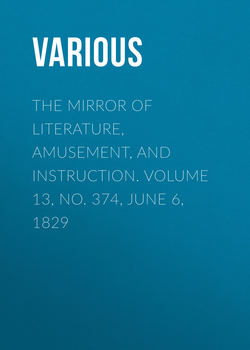Читать книгу The Mirror of Literature, Amusement, and Instruction. Volume 13, No. 374, June 6, 1829 - Various - Страница 3
HOLLAND HOUSE, KENSINGTON
ITALIAN IMPROVISATRI
Оглавление(To the Editor of the Mirror.)
Allow me permission, if consistent with the regulations of your interesting miscellany, to submit to you a literary problem. We are informed that there exists, at the present day, in Italy, a set of persons called "improvisatri," who pretend to recite original poetry of a superior order, composed on the spur of the moment. An extraordinary account appeared a short time back in a well known Scotch magazine, of a female improvisatrice, which may have met your notice. Now I entertain considerable doubt of the truth of these pretensions; not that I question the veracity of those who have visited Italy and make the assertion: they believe what they relate, but are, I conceive, grossly deceived. There is something, no doubt, truly inspiring in the air of Italy:
For wheresoe'er they turn their ravish'd eyes,
Gay gilded scenes and shining prospects rise,
Poetic fields encompass them around,
And still they seem to tread on classic ground;
For there the muse so oft her harp has strung,
That not a mountain rears its head unsung:
Renown'd inverse each shady thicket grows,
And ev'ry stream in heav'nly numbers flows.
Notwithstanding this beautiful description, my scepticism will not allow me to believe in these miraculous genii.
Lord Byron mentions these improvisatri, in his "Beppo," but not in a way that leads me to suppose, he considered them capable of original poetry. Mr. Addison, in his account of Italy, says, "I cannot forbear mentioning a custom at Venice, which they tell me is peculiar to the common people of this country, of singing stanzas out of Tasso. They are set to a pretty solemn tune, and when one begins in any part of the poet, it is odds, but he will be answered by somebody else that overhears him; so that sometimes you have ten or a dozen in the neighbourhood of one another, taking verse after verse, and running on with the poem as far as their memories will carry them."
I am, therefore, inclined to think these "improvisatri" are mere reciters of the great Italian poets. It is probable that the persons who give us these extraordinary accounts of Italian genius, are unacquainted with the literature of that country, and of course cannot detect the imposition.
In Goldsmith's poem, entitled "Retaliation," a line occurs, which is to me unintelligible, at least a part of it. That poet concludes his ironical eulogium on Edmund Burke, thus:—
"In short 'twas his fate, unemployed, or in place, sir,
To eat mutton cold, and cut blocks with a razor."
The cutting blocks with a razor, I think is obvious enough, but, what is meant by eating mutton cold? I should be obliged by a solution.—HEN. B.
